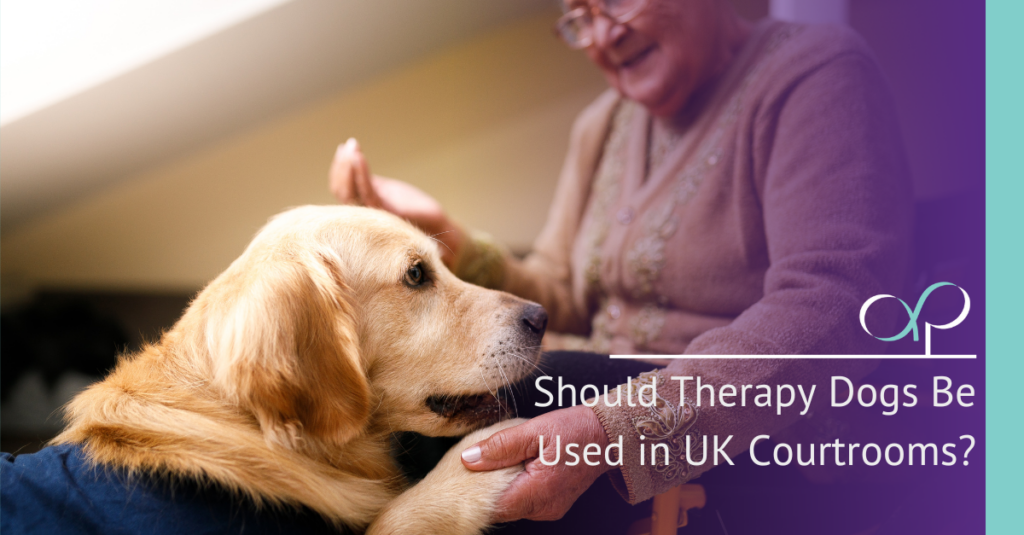The use of therapy dogs in courtrooms has sparked both interest and debate. These specially trained dogs provide comfort and emotional support to individuals facing
stressful legal proceedings.
Whilst they are common in some countries, the UK has been relatively cautious in adopting this practice. Therefore this article will explore the pros and cons of having therapy dogs in UK courtrooms.
The Benefits
😀 Reducing Stress and Anxiety: Courtrooms can be intimidating and emotionally stressful environments. For litigants, witnesses, and even court staff, the experience can be overwhelming. Therapy dogs offer a calming presence,
helping to alleviate stress and anxiety as it is proven that petting a therapy dog can reduce blood pressure.
😀 Comfort for Vulnerable Witnesses: Children, victims of crime, and those with developmental disabilities often find testifying in court traumatic. Having a therapy dog by their side can provide reassurance and emotional support during
their testimony. Therapy dogs in America are most frequently used in family court proceedings as they are highly valuable for children, who may not understand what exactly is happening or the seriousness of what has occurred. According to studies 54% of witnesses in criminal cases could be classified as vulnerable.
😀 Humanizing the Legal Process: The presence of a friendly dog can make the courtroom feel less sterile and more inviting. It reminds everyone that legal proceedings involve real people with emotions and vulnerabilities.
😀 Improved Well-Being: Interacting with therapy dogs has been linked to reduced blood pressure, increased feelings of happiness, and improved overall well-being. These benefits can extend to those involved in court cases which mostly
stressful environments occur.
The Concerns
🤔 Fairness and Impartiality: Some argue that therapy dogs might influence jurors or judges. Could a juror be swayed by a dog’s presence? Ensuring a fair trial is
essential, and any potential bias must be carefully considered.
🤔 Allergies and Phobias: Not everyone is comfortable around dogs. Some people have allergies or phobias related to animals. Balancing the needs of vulnerable witnesses with the potential discomfort of others is a challenge.
🤔 Logistical Challenges: Introducing therapy dogs requires planning and coordination. Courts need to address issues like hygiene, safety, and training. Additionally, not all courtrooms may be suitable for accommodating dogs.
🤔 Legal Precedent: The use of therapy dogs could set legal precedents. Courts must weigh the benefits against any unintended consequences or legal challenges.
So, Should we adopt therapy dogs into our courtrooms?
While therapy dogs have proven effective in reducing stress and providing comfort, their use in UK courtrooms should be approached cautiously. Clear guidelines, proper training, and sensitivity to individual needs are crucial.
Ultimately, the decision should prioritise fairness, empathy, and the well-being of all involved parties. Therefore, it may be beneficial to begin by introducing therapy dogs in certain types of courts, such as family courts, where there is a higher rate of vulnerable witnesses rather than placing
them in all courtrooms.
By Flo Payne, Paralegal

